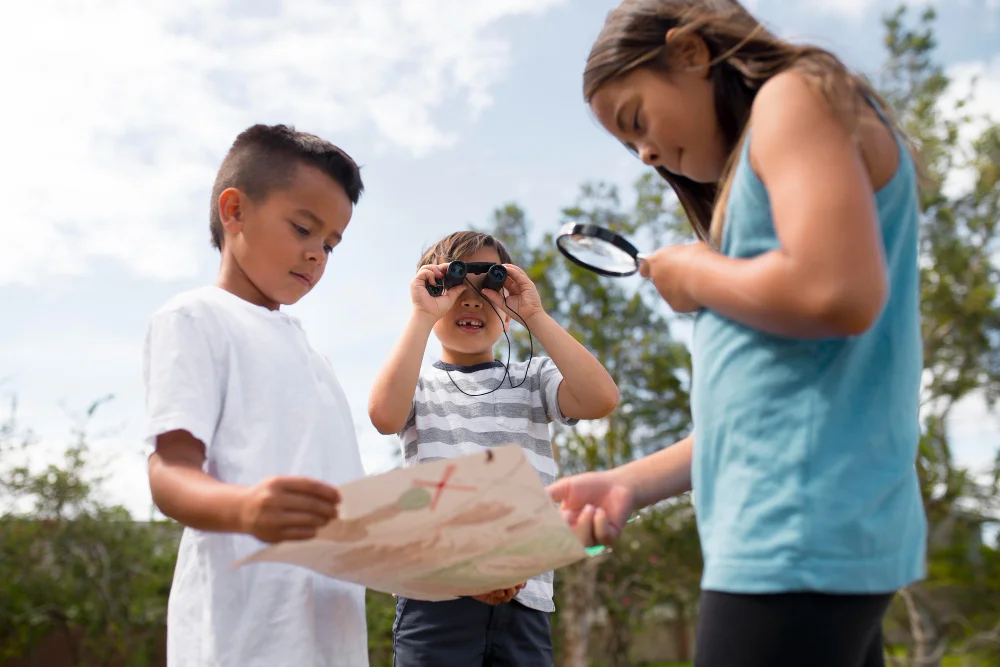Social studies words form the foundation of how your child understands the complex world around them. Political science, demography, economics, and psychology stand as the top four disciplines within this crucial field. However, many students struggle to grasp these concepts without a solid foundation in vocabulary.
When your child develops strong social studies vocabulary, they gain more than just academic knowledge; they build citizenship skills for life. Research indicates that individuals with lower levels of education are less likely to vote and participate in civic activities.
Additionally, the debate surrounding social studies education continues to evolve, with educators like Rev. Dr. Mitch Randall expressing concerns about the accuracy of teaching these essential concepts. This teacher’s guide will help you identify and prepare the most critical social studies vocabulary words, from basic definitions to comprehensive word lists organised from A to Z.
Core Social Studies Vocabulary Categories
Understanding social studies vocabulary requires recognising how these terms fall into distinct categories. Breaking down these social studies words into organised groups helps your child build a comprehensive knowledge foundation.
Civics and Government Terms
Civics vocabulary centres around how societies organise and govern themselves. Key terms include democracy (government by the people), republic (government through elected representatives), monarchy (rule by a single person, such as a king), and dictatorship (absolute control by one person or a small group). These forms of government shape how societies function through concepts like authority, power, and citizens’ liberties.
Understanding terms like constitution (the basic principles and laws of a nation) and separation of powers (the division of power between branches of government) helps children grasp how governments maintain order while protecting individual freedoms.
Geography vocabulary focuses on the physical world and how humans interact with it. Essential terms include landforms (natural physical features), climate (long-term weather patterns), and region (areas with similar characteristics). Children should also understand geographic tools, such as maps, globes, and satellite images, that help them study the Earth.
Furthermore, concepts such as absolute location (exact position expressed through coordinates) and human geography (the relationship between humans and the Earth) enable children to analyse spatial relationships. Learning these words helps your child interpret the world around them.
History and Culture Vocabulary
History and culture terms help children understand human development over time. It is (study of humans in the past provides context for modern societies, while culture (shared attitudes, values, goals, and arts of a group) explains how people live together. Essential concepts include society (a collection of individuals with shared characteristics), traditions (continuing patterns of beliefs or practices), and various religious systems, such as Buddhism, Christianity, Hinduism, Islam, and Judaism. These terms help children recognise how cultural diffusion (the spread of ideas among places) shapes human experience.
Economics and Trade Concepts
Economics vocabulary explores how societies produce and exchange goods and services. Core concepts include scarcity (the insufficient supply to meet demand), production (the process of creating goods or services), and consumption (the use of goods and services).
Your child should understand natural resources (materials extracted from the earth for economic gain), human resources (talents and skills), and capital goods (human-made materials required for production). Specifically, terms such as import (goods brought into a country from another), export (goods sold to another country), and trade barriers help explain how global economies interact.
8 Essential Social Studies Words and Definitions

These fundamental social studies words serve as building blocks for your child’s understanding of society, politics, and human interaction. Mastering these eight core terms provides a framework upon which more complex social studies concepts can develop.
1. Democracy: A Key Concept in Social Studies Words
Democracy comes from Greek words meaning “rule by the people.” First practised in ancient Athens, democracy allows citizens to participate in government either directly or through elected representatives. In early Greek democracy, only wealthy landowners were permitted to vote, excluding women and slaves. Modern democracies, such as the United States, operate as representative democracies, where senators and representatives speak on behalf of larger groups of citizens.
2. Citizen: Through Essential Social Studies Words
A citizen is a full member of a country with both rights and responsibilities. Citizens have the right to be protected by their country’s laws, but they must also fulfil duties, such as showing loyalty to their nation. Citizenship differs from nationality, which simply indicates the country of a person’s origin. People become citizens through birth in a country, having citizen parents, marriage to a citizen, or through naturalisation.
3. Economy
The economy refers to how societies produce and exchange goods and services. Understanding economic concepts helps children recognise how resources are distributed and how trade functions between regions and countries. Economic literacy enables your child to make sense of terms like scarcity, production, consumption, and trade they’ll encounter throughout their education.
4. Culture
Culture encompasses patterns of behaviour shared by a society or group, including food, language, clothing, tools, music, arts, customs, beliefs, and religion. Essentially, every human society has its unique culture primarily shaped by its environment. Anthropologists have discovered that certain cultural elements exist universally but are expressed differently across societies. Culture passes from one generation to the next, although it evolves when different groups interact.
5. Government
A government is the system of rules and people who make and administer those rules. Governments create laws, collect taxes, print money, establish justice systems, maintain police forces, conduct diplomacy, and defend the country. The leader and advisors are often referred to as the administration. Different forms of government exist worldwide, with democracy being widespread in Western countries.
6. Geography
Geography explores both the physical features of Earth and how humans interact with their environment. This discipline helps children understand landforms, climate patterns, and spatial relationships. Geographic knowledge builds critical thinking and spatial reasoning skills that prove vital for interpreting the changing world around them.
7. Rights
Rights are protections and freedoms that belong to all people, with children having specific rights outlined in the United Nations Convention on the Rights of the Child. These include the right to identity, privacy, education, safety, and protection from exploitation. Understanding rights helps children recognise their value and the importance of respecting others.
8. Community
A community is a social unit characterised by shared characteristics, including place, norms, culture, religion, values, and identity. Communities offer their members a sense of belonging and a shared purpose. Unlike random groups, communities foster a sense of responsibility toward fellow members. Communities form for various reasons, including survival, protection, religious practice, or solving everyday problems.
How to Teach Social Studies Vocabulary Effectively

Teaching social studies words requires engaging methods that connect abstract concepts to children’s experiences. Beyond memorisation, effective vocabulary instruction builds lasting comprehension through multiple approaches tailored to different learning styles.
Use real-world examples
Relating social studies vocabulary to everyday situations helps children grasp complex concepts more effectively. By contextualising terms through historical events, current issues, or personal experiences, you make abstract ideas tangible. Instead of simply defining “democracy,” discuss how your child participates in family decisions. Likewise, explain the concept of “economy” through shopping experiences or allowance management. This approach demonstrates how these concepts extend beyond textbooks into daily life, fostering more profound understanding and increased engagement.
Incorporate visual aids and maps.
Visual tools dramatically improve vocabulary retention, especially for spatial concepts. Maps serve as essential tools for teaching geography terms, with research confirming that children as young as four or five can learn mapping concepts through proper instruction. Interactive maps enable students to explore multiple layers of information simultaneously, facilitating more effective analysis of patterns. When teaching terms like “region” or “climate,” use labelled maps that children can manipulate to reinforce their understanding.
Create vocabulary flashcards
Flashcards provide interactive, personalised vocabulary practice. On one side, write the new term; on the reverse, include the definition, part of speech, and a sample sentence demonstrating proper usage. Encourage your child to illustrate the cards, as visual representations enhance retention. These cards work particularly well because they appeal to various learning styles and allow children to shuffle terms or remove mastered words.
Encourage group discussions
Learning fundamentally occurs through social interaction, as students develop their understanding by exchanging ideas and perspectives. Group discussions allow children to process new vocabulary through meaningful dialog, reinforcing comprehension as they hear terms used in various contexts. These conversations help students see social studies as evolving interpretations rather than fixed truths, developing critical thinking alongside vocabulary knowledge.
Use storytelling to explain terms.
Stories make complex social studies words and definitions accessible and memorable. Research indicates that knowledge stored in our minds is mainly in the form of stories. When introducing terms like “community” or “citizenship,” incorporate narratives that demonstrate these concepts in action. Stories create a shared language among learners, with unique details serving as memory hooks for more complex historical concepts.
Tools and Resources for Building Vocabulary
Effective teaching of social studies concepts relies heavily on quality resources that reinforce vocabulary development. Beyond teaching methods, having the right tools makes vocabulary instruction more engaging and productive.
Printable word lists and worksheets
Quality printable resources help children master social studies vocabulary through structured practice. Education.com offers worksheets on diverse topics, ranging from map reading to historical figures, assisting students to appreciate perspectives beyond their immediate environment. These grade-specific materials allow first graders to learn about senses and feelings while older students explore the Underground Railroad. Moreover, Canva provides professionally designed templates for different grade levels that teachers can quickly customise based on specific lesson topics.
Interactive games and quizzes on Social Studies Words
Digital learning tools transform vocabulary practice into engaging activities. Quizlet stands out as an excellent free resource for creating or finding flashcard sets to practice vocabulary. Students particularly enjoy the Match game and Quizlet Live for their collaborative learning benefits. Throughout classroom implementation, “bingo” serves as an effective review activity, where students fill in bingo grids with vocabulary words while the teacher reads the definitions.
Online dictionaries and apps
Specialised reference tools provide context-specific definitions for social studies words and definitions. The Bitbucket dictionary offers 1,000 entries covering sociology, criminology, political science, and women’s studies with Canadian examples. During vocabulary lessons, students can access the New Words Dictionary on texasbeyondhistory.net to research terms and complete worksheets.
Social studies Words A-Z charts
Organized alphabetical resources help children visualize relationships between social studies words a-z. VocabularySpellingCity provides comprehensive word lists for K-8 students covering geography, sociology, anthropology, and economics. The platform offers ready-made lists for U.S. History, Ancient World Cultures, and community life topics. Within the classroom, displaying word walls creates visual reminders of current vocabulary, ideally including the word, definition, and supporting image.
Conclusion on Social Studies Words
Building a strong social studies vocabulary empowers your child with tools to understand our complex world. Throughout this guide, you’ve seen how these foundational terms connect across civics, geography, history, and economics, creating a framework for lifelong civic engagement.
Social studies vocabulary serves as more than academic knowledge. Instead, these terms help your child develop critical thinking skills, cultural awareness, and citizenship abilities that extend far beyond the classroom. Understanding concepts like democracy, rights, and community prepares them to participate meaningfully in society.
Your teaching approach matters significantly. Real-world examples, visual aids, flashcards, discussions, and storytelling all work together to transform abstract concepts into relatable knowledge. These methods cater to different learning styles while making vocabulary both memorable and applicable.
The resources outlined, from printable worksheets to interactive games, provide practical tools for reinforcing these essential terms. Additionally, specialized dictionaries and A-Z charts offer structured ways to expand vocabulary systematically as your child progresses.
Remember that adequate social studies education happens gradually. Your consistent effort to introduce, explain, and reinforce these key terms will help your child build connections between concepts. After all, a child who understands social studies vocabulary gains not only academic success but also develops into an informed and engaged citizen, ready to navigate an increasingly interconnected world.



